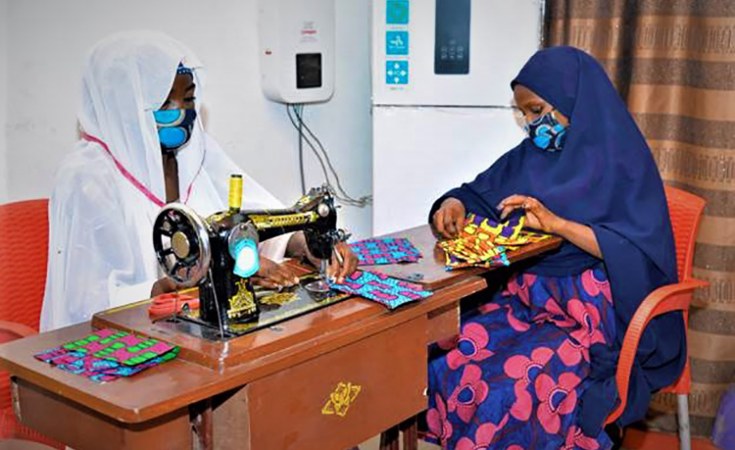According to UN World Population Prospects, the world's youngest countries are in Africa. Overall, almost 60 percent of Africa's population is under the age of 25. The booming youth population has always been celebrated as good news and considered to be Africa's greatest asset. These youth are tech-savvy, innovative, educated, and talented.
Yet, during COVID19, Africa's biggest asset - the youth - remains an untapped resource, and young people's voices are stifled by a lack of participation and representation. In addition, their skills, talents, and abilities to propose solutions to address COVID-19 crisis and other challenges that have arisen, including rising food insecurity and unemployment, remain unharnessed. When their capabilities have been harnessed, the coverage has been marginal.
Numerous articles have highlighted the role youth can play and made the case as to why youth are key. Also, members of the U nited N ations Inter-Agency Network on Youth Development recently released a statement calling on countries to partner with young people during and after the pandemic and to further recognize their potential to advance the fight against it.
A s African countries continue to battle the pandemic and begin to think of recovery efforts and reopening and restarting economies, they must re-engage and re-empower the youth. Echoing the United Nations Secretary-General 's words, we must tap onto youth's talents to tackle the COVID-19 crisis and the challenges that will follow.
How?
Incorporating and tapping into African youth skills and talents require recent data on the current state of young people and the skills and talents they possess. African countries, the African Union, the United Nations, the African Development Bank, the World Bank, think tanks, and other stakeholders that have an interest in harnessing the youth dividend to bring prosperity and sustainable development to the African continent post- COVID-19 need to have real-time data.
The time is ripe for countries to roll out national surveys administered by presidents' offices or ministries of youth affairs via cell phones or snail mail to capture the state of affairs. These surveys should seek to capture the unique challenges that African youth have faced before and during the pandemic and get feedback on the future aspirations of the youth, including the type of jobs and employment opportunities they will seek post-COVID-19. While the future continues to be uncertain, getting a glimpse into the thinking of African youth can help provide a foundation of information on which to make decisions about how best to serve them.
Once African countries have data, it is crucial to put together task forces consisting of diverse experts, including young experts, to analyze the survey data and use the answers to come up with blueprints and white papers on how best they can use the talents and skills of young people to develop the continent while creating employment opportunities. Working with existing consulting companies and think tanks could go a long way since they have the expertise and experience to use data to deliver insights and make suggestions on how African countries can move forward.
As an example, the Organization for Economic Co-operation and Development recently administered a survey for youth organizations drawn from more than 40 countries. This was followed by a webinar that discussed survey findings, specifically touching on how youth could participate in national recovery responses. In addition, these responses will be used to write a policy paper and help governments in taking into consideration young people's perspectives in implementing COVID-19 response measures and building resilience.
At the moment, the challenge at hand for African countries is reimagining how to solve the issue of youth unemployment. Before the pandemic, more than 15 million young people faced unemployment for numerous reasons. From Kenya to South Africa to Nigeria and Ghana, this number will likely increase.
The continent must invest in understanding trends about the future of work in Africa and globally. What industries will thrive post-COVID-19? We have already seen several companies indicating that employees can stay at home. Will working from home continue? If it becomes common, should African governments create new opportunities exclusively for the youth? Doing so will help the continent to create unique and fulfilling future work opportunities.
Increasingly, consulting companies such as McKinsey are continuing to share insights about how to reimagine work, a move in the right direction. The insights could be useful for the African continent as they continue to think through these challenges.
Undeniably, technology has been central in sustaining work during COVID-19 and will continue to be a big part of the future of work. And because technology will continue to be important, there is a need to invest in the infrastructure needed so that the youth can make the most out of any technology-related employment opportunities. Finally, once opportunities have been identified, it will take investments and training the youth so that they have updated skills and resources they need to tap on these opportunities.
Efforts towards engaging, empowering, and tapping onto African youth skills, talents, and capabilities as countries continue to battle COVID-19 and work towards reopening countries must be intensified and accelerated at local, national, and regional levels. The youth remain Africa's greatest asset. Including them and empowering them with the skills they need to thrive post COVID-1 9 is essential and will facilitate a stable and prosperous Africa.
Dr. Esther Ngumbi is an Assistant Professor with the Entomology Department at University of Illinois at Urbana Champaign, Illinois. She is a Senior Food Security Fellow with New Voices, The Aspen Institute and has also serves as a Clinton Global University Initiative (CGIU) mentor for Agriculture.


